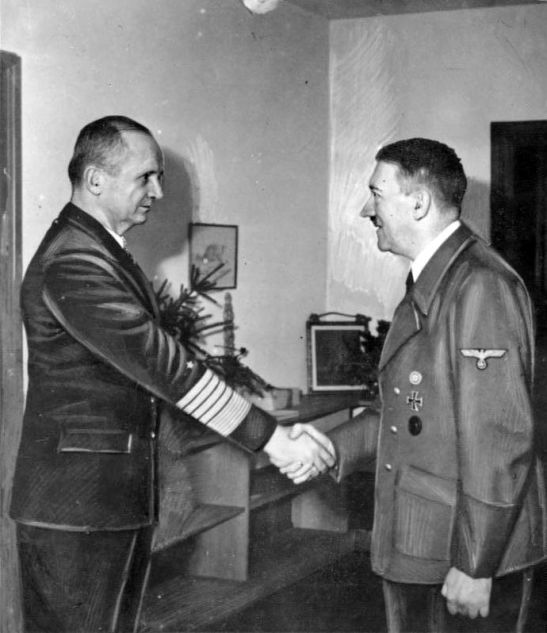On 10 May, the cross-examination ended with Defendant Karl Dönitz, who after Hitler’s suicide on 30 April 1945, assumed the posts of President of the Third Reich and Commander-in-Chief of the German Armed Forces.
Dönitz made some surprising statements: in response to a question from the Deputy British prosecutor at the Nuremberg trials, Sir David Maxwell-Fyfe, Dönitz summed up the German political system as follows: “One cannot call it a ‘military dictatorship’. It was not a dictatorship at all.”
He regarded the mass deportation and then physical extermination of millions of Jews as a military and strategic factor. The former navy commander attributed the German army’s success in the first half of the war to measures taken against the Jews. On 12 March 1944, Dönitz said in a public speech: “Split into parties, beset with the spreading poison of Jewry and vulnerable to it, and lacking, as a defence, our present uncompromising world outlook, we would long since have succumbed to the burdens of this war and been subject to the merciless destruction of our adversaries.”
On 10 May 1946, after everything he had heard at the Nuremberg trials, he only slightly modified his view of the “spreading poison of Jewry”. “I could imagine that it would be very difficult for the population in the towns to hold out under the stress of heavy bombing attacks if such an influence were allowed to work”.
But he made his most striking statement when questioned by Colonel Yuri Pokrovsky, the USSR’s Deputy Chief Prosecutor, about the events of early May 1945, when even Hitler became disillusioned and took his own life.
“Col Pokrovsky In your address to the Army and to the people, you demanded the continuation of military operations. And all those who were opposed to resistance were called traitors and cowards, is that not so?
Dönitz Yes.
Col Pokrovsky Do you agree with the fact that on 30 April also, right on the day you published the two documents that we are talking about now, it was absolutely clear that further resistance of Hitlerite Germany was absolutely aimless and useless? Do you understand my question? Do you agree with that?
Dönitz Yes, I understood the question. May I say the following: I had to continue fighting in the East in order to rescue the refugees who were moving to the West…
Col Pokrovsky Still you did not answer my question, Dönitz, did you? Even though it was very clearly put. I repeat it once again so that you can attempt to understand it. Do you agree with the fact that already on 30 April it was fully clear that further resistance of Hitlerite Germany was absolutely aimless and useless? Answer me ‘yes’ or ‘no’.
Dönitz No, that was not clear.”
Sources:
Transcript of the 9-10 May 1946 Sessions of the International Military Tribunal, “World History” Website http://historic.ru/
























